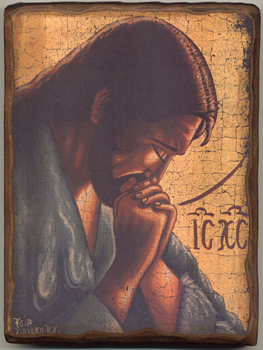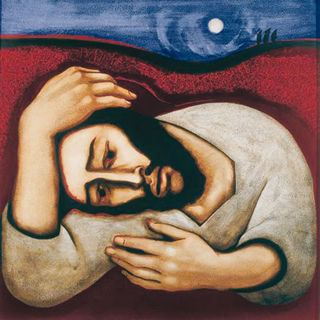For Sunday May 24, 2020
Lectionary Readings (Revised Common Lectionary, Year A)
Acts 1:6-14
Psalm 68:1-10, 32-25
1 Peter 4:12-14, 5:6-11
John 17:1-11
To ask what role prayer plays in our world right now — a world rife with pain, illness, loss, and death — is to raise the hardest questions I can think of about God. Honestly, they are questions I don’t know how to answer. Does God routinely intervene in human affairs? Does his intervention — or lack of it — depend in any way on our asking? Can prayer "change" God? Change circumstances? Change us?
Whatever the answers to these questions might be, we know one thing for sure: Jesus prayed. Jesus asked. Jesus made supplication to God. On this last Sunday of Easter, as we continue to face the horrors of Covid-19, we’re invited to listen in as Jesus makes a “High Priestly Prayer” to his Father. The setting for his prayer is the Upper Room on Maundy Thursday, and the mood in the room as Jesus talks to God is heavy and poignant. He has just said goodbye to his disciples, and every word, deed, and gesture he has offered them is weighted with grief. He has washed their feet, fed them bread and wine, promised them the Holy Spirit, and commanded them to love one another. He has spoken to them with both tenderness and urgency, as if time is running out. Because it is.
Now, in the last moments before his arrest, he looks up to heaven and articulates his heart’s deepest desires to God. “I am asking,” he says. I am asking.
I’ve heard some people call Jesus’s high priestly prayer the “other” Lord’s Prayer — the one we don’t memorize and recite on Sunday mornings. It’s not pithy and poetic like the “Our Father.” It doesn’t flow, or cover its bases with anything like efficiency — it’s long, rambling, and rather hard to follow. And though the disciples are meant to overhear the words, Jesus’s tone has an urgency and passion to it that is achingly private. Jesus is doing more than teaching in this moment; he’s rending his heart.
In his beautiful book entitled, Tokens of Trust, the former Archbishop of Canterbury, Rowan Williams, describes the strangeness and wonder of a Jesus who prays: “Yes, Jesus is a human being in whom God’s action is at work without interruption or impediment. But wait a moment: the Jesus we meet in the Gospels is someone who prays, who speaks of putting his will and his decisions at the service of his Father. He is someone who is in a relationship of dependence on the one he prays to as Father. In him there is divine purpose, power, and action; but there is also humility, responsiveness, and receptivity.”
| |
I’m inclined to add one more word to Archbishop Williams’ list: vulnerability. Jesus spends his final hours on earth in humble, vulnerable supplication to God. He ends his ministry by asking into uncertainty. Hoping into doubt. Trusting into danger. Asking is the last act of love he pours out to the disciples gathered around his table. It is the last tender memory he gives them. The last gesture of hope he extends. Contrary to what we might expect (or prefer), he doesn’t awe his followers with a grand finale of miracles, or humble them with a show of divine authority and power. He looks up to heaven with a trembling heart, and surrenders his cherished friends to God.
I am asking. Requesting. Hoping. As if to say: “God, I don’t know what you will do with my request. I don’t know how or when or if you will answer this prayer. I can't force your hand. But I am staking my life and the lives of my loved ones on your goodness, because there’s literally nothing more I can do on my own. I have come to the end of what this aching love of mine can hold and guard and save. I am asking.”
To return to where I started: there are so many tough questions to ask about prayer right now, and it’s okay for us to ask them. But even in the midst of our questioning, it’s important to remember that Jesus spent his last hours modeling heartfelt conversation with God. Perhaps the takeaway for us is that when all else falls away, prayer remains. Even when circumstances feel dire, prayer offers us a sturdy bridge between our hearts and God’s, between our questions and God’s promises, between our longings and God’s grace. Prayer paves a way forward into renewed hope, strength, meaning, and possibility.
But that’s just the fact of prayer. What about its content? What does Jesus ask for in his high priestly prayer? Well, many things, but one request stands out to me right now — not least because it has not yet been answered: “Holy Father, protect them in your name that you have given me, so that they may be one, as we are one.”
 |
That they may be one. Earlier in John’s Gospel, Jesus commands his disciples to love one another so that “everyone will know” that they are followers of Christ. On the night before his death, Jesus declares the loving unity of his disciples the litmus test of Christian witness. Our ability to love one another across differences, our willingness to preserve and cherish our God-ordained oneness, is precisely how the world will know who we are and whose we are. Our love for each other is how the world will see, taste, touch, hear, and find Jesus. It’s through our unity that we will embody Jesus, make Jesus relatable, possible, plausible, to a dying world.
I can’t speak for you, but this makes me tremble right now, because the signs of our disunity are everywhere. What Jesus seems to be saying is that if we fail to reconcile and unify, if we normalize divisiveness, separation, bitterness, and discord, the world won’t know what it needs to know about God, and in the terrible absence of that knowing, it will believe falsehoods that break God’s heart. It will believe that the whole Jesus thing is a sham. It will assume that there really is no transformative power in the death and resurrection of Christ. It will decide that God is a mean, angry, vindictive parent, determined only to shame and punish his children. It will believe that the universe is a cold, meaningless place, ungoverned by love. It will write off the Church as a flawed and hypocritical institution — not Christ’s living, breathing, healing body on earth.
Such is the power we wield in our decisions to love or not love. To “be one” or to be divided. Such are the stakes involved in how we choose to respond to Jesus’s dying wish, hope, prayer, and commandment. Such is the responsibility we shoulder, whether we want to or not.
 |
What scares me most about Jesus’s prayer for our unity is that I’m numb to the aching desire at its heart. I’m apathetic. I’m complacent. I’m cynical. I take Christian disunity so completely for granted, I barely notice it anymore. What breaks God’s heart no longer breaks mine. I’m not scandalized — as I should be — by the fact that we Christians have more denominations, communions, and splinter groups than I can count. I barely bat an eye when another local church splits into two. I don’t grieve over the fact that I can “church shop,” as if churches fall into the same consumerist categories as clothes, shoes, houses, or hair products.
And yet Jesus spent his last night on earth pleading for the unity of his followers. Praying that the Church would be one as he and the Father are one. Not uniform, but unified. Committed to a sacred tie that binds. Determined to love, reconcile, bless, and unify across all barriers.
Two thousand years after Jesus prayed for unity, maybe we can begin by praying for it, too. Maybe we can realign our desires with Jesus’s, and ask God for an end to complacency, cynicism, hopelessness, and defeat. “That they may be one” remains God’s cherished desire. May it become ours as well.
Debie Thomas: debie.thomas1@gmail.com
Image credits: (1) Ukrainian Orthodox Church of the USA Bookstore; (2) E-mporion; and (3) Marist Messenger, New Zealand Province of the Society of Mary.





